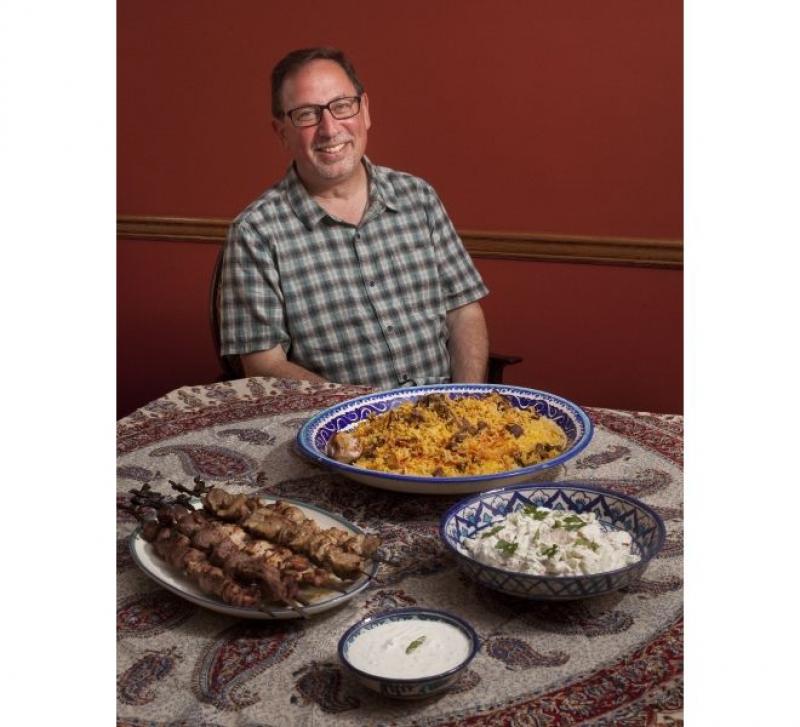July 19, 2016
Scott Levi's Central Asian Cooking Featured in Dispatch
Professor Scott Levi doesn't just teach with textbooks. This summer during the Central Asia in World History Summer Institute he is also teaching with food. Tuesday, July 19th's Columbus Dispatch featured the following article about him.
Ohio State professor's cooking brings central Asian culture alive for teachers
by Lisa Abraham
The pungent scents of cumin, garlic, onions and turmeric fill the air in Scott Levi’s Bexley kitchen with the aroma of central Asian street food.
Levi, an Ohio State University history professor, is taking a practice run at his upcoming cooking demonstration on the food of central Asia.
The food, he explained, is “from the 'stans” — Uzbekistan, Kazakhstan and Turkmenistan — countries that, for thousands of years, served as the crossing point along the Silk Road trading routes between the Far East and Middle East and beyond to Europe.
Despite the region’s historical significance, its culture remains largely unknown — a situation that Levi hopes to change.
For the second time since 2012, Levi has organized a summer institute, “Central Asia in World History,” which brings together 25 middle- and high-school teachers from throughout the country for three weeks of intensive study.
The institute, which runs through July 29, features lectures by some of the country’s leading experts on central Asia, and a few lighter moments — including Levi’s cooking demonstration, "Culinary Adventures Along the Silk Road," which will take place Saturday at the Ohio Union kitchen.
Levi, 47, an associate professor at Ohio State since 2008, will prepare a variety of recipes he has collected during his travels in the region.
“This food, in particular, is from Uzbekistan,” he explained.
The menu includes marinated lamb and chicken shish kebabs, dill-spiked yogurt sauce and a cool salad of cucumbers, radishes and herbs dressed with feta cheese and sour cream.
A main feature is a stew of lamb, carrots and basmati rice, known as plov.
For the dish, Levi browns cubed lamb in a Dutch oven, then adds onion; copious amounts of toasted, ground cumin seed; paprika; turmeric; and 10 cloves of garlic.

Julienned carrots are added to the sauce, which is then topped with water, and, finally, three cups of basmati or other short-grain rice.
A tight lid covers the dish, which simmers for about 30 minutes, the rice on top steaming from the boiling lamb mixture below and, from the turmeric, changing colors to vivid gold.
Central Asian cuisine, Levi said, is heavy with meat, particularly lamb and rendered lamb fat. It resembles Middle Eastern fare but also blends some elements of east Asian cuisine, including noodle dishes similar to lo mein.
The summer institute is supported this year, as it was in 2012, by a grant from the National Endowment for the Humanities.
Levi's goal is to foster a greater understanding of how the region has historically “served as a crossroads of intercultural exchange.”
He includes the cooking demonstration to help bring the region alive in a real way — through smells and tastes.
“I love cooking, and it’s a great way to explore the culture,” Levi said.
Barbara Ashbrook, assistant director for the division of education programs of the National Endowment for the Humanities in Washington, was present for Levi’s cooking demonstration in 2012 and said the food helped to create a complete immersion in the culture.
“People bond around food,” she said. “You get a sense that food is global,”
The plov, Ashbrook recalled, was a delicious, hearty dish of varied spices.
“It was really a wonderful learning experience.”
Nathan Rosenstein, chairman of the OSU History Department, said the university takes pride in the institute's effort to spread the word nationally about central Asian history.
“This is an area that’s becoming increasingly important in world history, and something that our young people need to know about and understand that this is a rich history," he said. "And Ohio State is one of the few places they can learn about it."
Levi hopes that the teachers return to their classrooms with broader knowledge to share about central Asia’s role in shaping history. And he hopes that will, in turn, inspire students to pursue the topic in future study.
Levi said, “I’m trying to plant the seeds for a deeper understanding in the next generation."
Read the original article here.
Photos by Tyler Stabile
